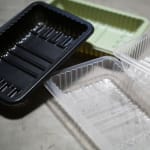
How do you know if you have made the right material choice? The best choice for your company, for the climate and for the future? Let our experts give you an objective assessment. Together we can uncover the truth about your sustainable choices.
Choosing packaging materials is no easy task. They have a function to fulfil, to protect the product, while being visually appealing, functional and sustainable. On top of that, they need to be cost-effective, recyclable and have the smallest possible carbon footprint. This presents a challenge, but it is a challenge we can solve.
“In-depth knowledge of different materials is key when it comes to choosing materials. This is something our experts can assist you with,” says Karl Banke from Scanfill’s technical customer support.
“It is a very complex matter and the most obvious choice is not always the correct one. Making the most material-smart choice requires taking a look at many aspects, such as function, food waste, sustainability and recycling.”
Choosing the optimal packaging material
Being material-smart means to consciously choosing optimal packaging materials while taking into account current demands concerning sustainability, climate footprint, function and cost.
During 2021, Scanfill’s parent company Polykemi conducted a scientific study to determine the carbon footprint of their materials. The study clearly showed that the choice of materials plays a significant role in combatting climate change. A corresponding study has now been carried out for Scanfill. The studies resulted in a unique calculation tool that enables the company's experts to calculate the carbon footprint of their materials when they leave the production plants in Ystad.
It provides Scanfill’s customers with the concrete and essential data needed to calculate the carbon footprint of each packaging they produce. This also helps the customers reach their environmental goals faster.
“We produce all the most commonly used materials, both virgin and recycled, which also means that we have created an objective assessment of each material. Our task is not only to find the most sustainable material, but more importantly the one that ideally suits each customer in terms of quality, function and recyclability,” explains Scanfill CEO Oscar Hugoson.
The study was conducted in co-operation with an external party to ensure its objectivity according to current the ISO-standard, and it has already helped many customers to make optimal material choices for their specific products.
“We are delighted to have been able to help so many customers reduce their carbon footprint, make their products more sustainable and save both resources and costs,” Hugoson says.
“We look forward to helping even more companies make smart material choices in the future.”

Being material-smart means choosing the optimal packaging materials and to use the right material in the right place.
News during the fall
Scanfill AB has a lot of new innovations to present this fall. The company has expanded its range and now offers materials in at least nine separate alternatives, six of which are different types of PP.
“We have an wide range, from virgin materials to various types of high-quality recycled raw materials. Our materials can be used for everything from food packaging to industrial trays. CO2 savings are important for the climate and for the future, so it is important to be material-smart and use the right material in the right place,” explains CEO Oscar Hugoson.
“This is exactly the type of variety we offer our customers.”
Scanfill’s materials
Scanfill AB currently offers nine materials:- Post Consumer Recycled PP
- Post Industrial Recycled PP
- BIO PP
- Chemically Recycled PP
- Virigin PP
- PP HiClear
- rPET
- rPS
- PS
Scanfill will also be exhibiting at FachPack in stand 5:212 and at Scanpack in stand F03:59. Welcome!



